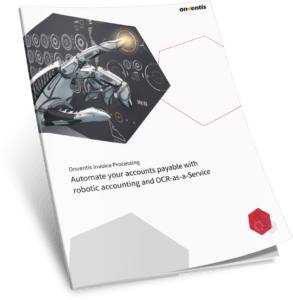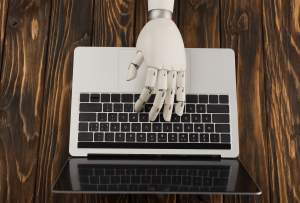What is OCR? An Insight Into the Automation of Invoice Processing
OCR stands for Optical Character Recognition and represents a technology for automatic text recognition in digital documents. Such software makes it possible to convert scanned and unstructured documents into editable and structured files. In doing so, such software reads the text contents from PDFs and image files without relying on human assistance. Documents are therefore digitized and converted into editable formats to render them accurately.

What is OCR? An insight into the automation of invoice processing
OCR stands for Optical Character Recognition and represents a technology for automatic text recognition in digital documents. Such software makes it possible to convert scanned and unstructured documents into editable and structured files. In doing so, the text contents from PDFs and image files are read by such software without relying on human assistance. Documents are therefore digitized and converted into editable formats in order to render them accurately.
How does OCR work in detail?
The OCR process involves several steps that convert images and unreadable files into structured datasets. Typically, OCR systems use a combination of image processing, machine learning, and pattern recognition technologies to identify text on a picture and change it into machine-readable text.
- Image capturing: The process starts with capturing the image or document in digital form. It is imported either as a scanned document or as an image file for further processing.
- Text recognition: In the next step, the image is prepared in order to recognize the text elements more easily. The document is converted to a two-color version to increase the contrast between the characters and the background. Binarization then analyzes dark and light areas and identifies the characters. The OCR process uses algorithms to recognize the characters in the image and convert them into text. This can be done either by simple character recognition, where each character is detected separately orby pattern recognition, where words and entire sentences are recognized.
- Conversion: The OCR process results in a machine-readable text that can be stored in a file and is ready for further digital processing. The quality of the result depends on the quality of the original image, the performance of the OCR system, and the sharpness and clarity of the text to be recognized.
OCR in invoice processing
Character recognition plays a growing role in various fields and is becoming increasingly important as digitization progresses. Optical character recognition is particularly important in invoice processing. Numerous opportunities arise here, as the degree of automation in accounts payable still leaves a great deal to be desired. Particularly in SMEs or mid-sized companies, the proportion of order items processed using electronic invoices is still too low. The reason for this is that non-digital invoice formats, such as PDFs or paper invoices, make digital processing difficult.
Share of order items with electronic invoice processing by annual revenue
Source: Benchmark des Bundesverbands Materialwirtschaft, Einkauf und Logistik e.V. (BME) „Top-Kennzahlen im Einkauf“
OCR is a crucial component for digitization and automation in the digital invoice processing , as it enables the capture of non-digital invoices. This means that all invoices, regardless of the format, can be processed using invoice processing software, whichreduces the workload for accounts payable managers. If a buyer receives an invoice as a PDF, they can save lot of effort and manual work using OCR. The result is unrestricted automation, which brings numerous advantages.
Increased productivity and time savings
OCR enables significantly faster invoice processing compared to manual methods. By automatically capturing data, large volumes of invoices can be processed more efficiently, enabling accounts payable departments to meet growing demands and increasing numbers of invoices. By eliminating the need to type invoice data manually, employees can focus on other value-added tasks that strategically contribute to business success. The result is increased productivity and time savings that immensely reduce the burden on accounts payable.
Accuracy and error minimization
Automatic text recognition reduces human errors that can occur during manual data entry. OCR software works precisely and can ensure high accuracy when extracting invoice data. This reduces the risk of errors and improves data quality by providing a reliable method for processing large volumes of invoices. Fewer errors and more transparency!
Cost savings through automation potential
OCR is a major step toward automated invoice processing. By integrating OCR into invoice processing systems, entire processes can be automated, including capturing, validating, and posting invoice data. This allows companies to reduce the cost of manual data capture and processing and achieve cost savings at every level through freed-up resources.
Tracking and transparency
OCR enables better tracking capabilities and transparency in the invoice processing process. Digital capture and storage of invoice data enables easy searching, verification, and archiving. As invoices are converted into editable and machine-readable records, they can be managed efficiently, making it easier to search for specific invoices, saving physical storage space, and enabling quick access to archived documents.
The future of invoice processing
OCR plays a critical role in integrating digitalization into procurement. It acts as a link for automated invoice processing, greatly simplifying the procurement process and making it highly productive. OCR significantly contributes to enterprises’ digital transformation and automation and helps increase the invoice processing efficiency and reliability.
The present and future of invoice processing are significantly shaped by OCR technologies and digitization. It is only a matter of time before all companies realize the enormous potential of automated invoice processing. With Onventis, you can already benefit from this potential today. Learn here how our accounting robots process your invoices automatically and how OCR is used to process non-digital invoices.
Weitere BlogsMore BlogsMeer blogs




